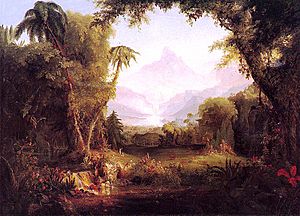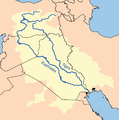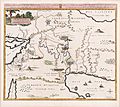Garden of Eden facts for kids

The Garden of Eden is a special place described in the Christian Bible. It is where the first man, Adam, and the first woman, Eve, lived. They were created by God.
In the Bible's book of Genesis, Adam and Eve lived peacefully in Eden. They were with all the animals. They took care of the garden. They could eat from any tree except one: the Tree of Knowledge. After they ate from this forbidden tree, God made them leave the Garden of Eden forever.
This story is found in Book of Genesis chapters 1-3. It is in the Old Testament of the Bible and the Tanakh. In the Tanakh, the Garden of Eden is sometimes called Paradise.
Contents
What the Name Eden Means
The word Eden comes from an old language called Sumerian. In Sumerian, Eden means a type of grassy plain called a Steppe. Sometimes, people talked about a "Heavenly Eden." This was a place that looked fertile at first. But then it would become dry and infertile.
Scientists who study climate say this describes what happened in a region called The Levant. This was after the last ice age. The green steppe became very dry. This meant food was not available all year round. It only grew at certain times. Because of this, people had to start agriculture. They also had to store food for when nothing was growing. Scientists call this big change the Neolithic Revolution. The story of Adam and Eve leaving the Garden also talks about this change in how people got food.
Some old stories from Babylon say that humans were created to grow food for the gods. But in the Bible, it's different. God created plants as food for humans. He also created animals to keep them company.
Some people think the beginning of the Book of Genesis describes a time before this climate change. They believe it shows how humans had to start growing crops. They also had to store food to survive dry periods. This means Genesis might cover the time from about 8000 to 6000 BC. It then goes up to about 2000 BC.
Why Adam and Eve Left the Garden
Different religions have their own ideas about why Adam and Eve left the Garden. They also explain what this means for people today.
Judaism
Judaism teaches that sin cannot be passed from parents to children. Everyone has free will. This means each person is responsible for their own sins. Humans can do both good and bad things. God's commandments help them do good things. The exact commandments are not all written down. They are developed through tradition. Sins can be forgiven once a year on a special day called Yom Kippur. Unlike Christianity, Judaism does not believe in a single evil being like the devil.
Christianity
Christianity believes that sin can be passed from parents to children. This is called original sin. Christians believe that without Jesus, humans would live in sin. A religious leader named Augustine of Hippo helped explain this idea. It is now a main belief in many Western Christian groups. These include Catholicism and Protestantism.
Islam
Islam sees Adam and Eve leaving the Garden as a chance for a new start. Islam teaches that the Christian idea of original sin is not true. This means that Adam and Eve leaving the Garden did not change the relationship between people and God. In Islamic stories, Adam and Eve were placed in different parts of the world. They had to wander around for a while before they found each other again.
Images for kids
-
The Expulsion illustrated in the English Caedmon manuscript, c. 1000 CE
-
Map by Pierre Mortier, 1700, based on theories of Pierre Daniel Huet, Bishop of Avranches. A caption in French and Dutch reads: Map of the location of the terrestrial paradise, and of the country inhabited by the patriarchs, laid out for the good understanding of sacred history, by M. Pierre Daniel Huet
-
Mozarabic world map from 1109 with Eden in the East (at top)
-
Fifth century "Garden of Eden" mosaic in mausoleum of Galla Placidia in Ravenna, Italy. UNESCO World Heritage Site.
-
After wandering through the Garden of Eden, Eve takes the forbidden fruit while Lilith speaks to Adam (by Carl Poellath, c. 1886)
See also
 In Spanish: Edén para niños
In Spanish: Edén para niños
 | Valerie Thomas |
 | Frederick McKinley Jones |
 | George Edward Alcorn Jr. |
 | Thomas Mensah |








